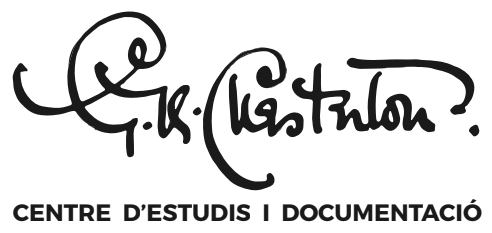Subjects
Family
Chesterton delivers a cerebral vision of family. Due to his high opinion of it, he defended it against the theories and practices which undermined it. In this manner, he fought against the eugenic thesis which were on the march in England in the early 20th century, decrying the government’s interference in private matters. Chesterton goes to such lengths as to proclaim: “If we are to preserve the family we must revolutionise the nation” (What’s Wrong in the World) and asks to preserve the intrinsic freedom in family: “the family is the test of freedom: because the family is the only thing that free man makes for himself and by himself” (The New Witness, 1919).
The common man
The aristocratic philosophies which were developed in Chesterton’s time often neglected the common sense of everyday people, the vision from the man in the street. Chesterton had to tackle these philosophies, such as those defended by H. G. Wells, G. B. Shaw and Nietzsche. To address them Chesterton suggests “to love and honour ordinary man and ordinary things” (Saint Francis of Assisi) and also helping common men to be common with an “extraordinary joy“. This does not mean for them to renounce to their own idiosyncrasy, but rather to live with a simple spirit their call to fulfilment.
Democracy
Chesterton believes in a democracy based on a true recognition of every person and their right to speak up. Chesterton even speaks of reverence towards the common man and awareness of every individual’s sacredness. Furthermore, this goes hand in hand with a kind of democratic feeling expressed in the notion one could belong to a “nation of kings” (Heretics). Thus, “true democracy consists in declaring that every chair is a throne” (On Running after One’s Hat and Other Whimsies).
Distributism
From an economic perspective, Gilbert Keith Chesterton’s intellectual work is set within the political, economic and social context of Europe’s Second Industrial Revolution. This context is influenced by the rise of the labour movement (and the expansion of socialist and anarchist beliefs) in response to the dismal life and working conditions in European industrial settlements. Following the Rerum Novarum encyclical (in which Pope Leo XIII set out the Catholic Church’s official position on the “workers’ question”), Chesterton and Hilaire Belloc set forward Distributism as an alternative economic system to both capitalism and socialism. Distributism accommodates Rerum Novarum’s own formulation, in which socialism is condemned and private property acknowledged while compelling Catholics (and the ruling class) to look after the common good and the protection of individual dignity, by essentially proposing for private property of the means of production to be distributed, to the extent possible, among the maximum number of people, or, as Chesterton put it, “too much capitalism does not mean too many capitalists, but too few capitalists”.
Tradition and modernity
Chesterton deeply believes in tradition, but in a very particular way. In this regard, Boyd claims that, although Chesterton was quite openly an advocate of tradition and a critic of modernity, he found a way of interpreting modern life through a positive light as a revelation in progress of religious truths (Chesterton & Orthodoxy). To be precise, Chesterton’s concept of tradition didn’t lie in an adoration of the past, but in the transmission of that which is rooted in life itself, and his anti-modernity, as exposed by Antuñano, criticized the idealist and materialist solipsism of the Enlightenment, on a quest for transcendence as outlined by medieval philosophy, in particular that of Saint Thomas. All in all, his idea was not to go back in time, but to, as expressed metaphorically by Chesterton himself, renovate over and over the lamppost so that it keeps illuminating his modernity properly.
